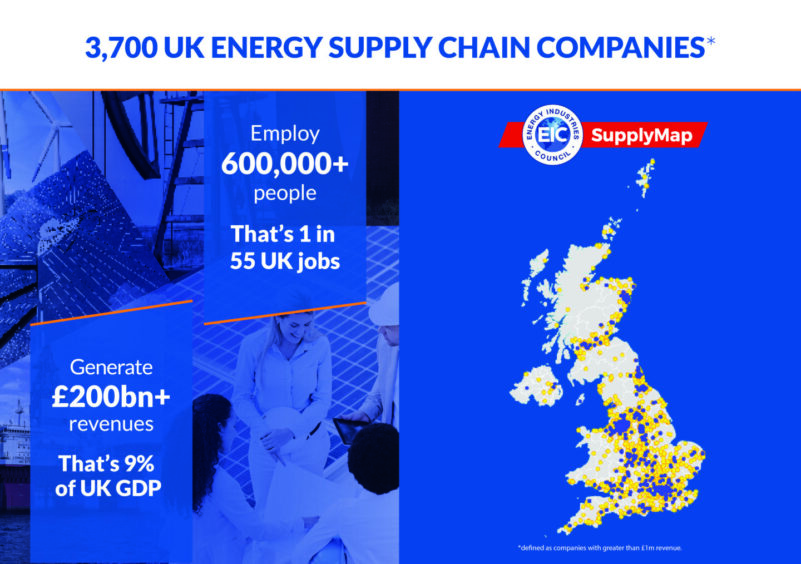Energy Industries Council’s (EIC) Stuart Broadley explains how the supply chain helps support the UK economy.
“Music can cut right through, simplifying what might otherwise be complicated feelings and problems.
Listening to UB40’s “1 in10”, their chorus sums up how so many companies feel today:
“I am the one in ten
A number on a list
I am the one in ten
Even though I don’t exist
Nobody knows me
Even though I’m always there
A statistic, a reminder
Of a world that doesn’t care”
Energy policy is centre stage in British politics in 2024, as it has been for the past four years since the build up to COP26 in Glasgow.
The flogging horse of industrial strategy, Energy Policy has swung wildly from anti, to pro, and now back to anti oil & gas in so many years.
This sea-sickening swell is bewildering, frustrating and unsettling for the thousands of business leaders who run the 3,700 energy supply chain companies in the UK (defined as companies with revenues of £1m or more, according to our own proprietary database EICSupplyMap).
Leaders just need calm heads and consistent policies to unlock much needed net zero investment and inspire confidence that the UK remains a safe place to be headquartered.
But why should energy policy makers care more about the supply chain?
Fact: the UK energy supply chain represents 1 in 55 UK jobs, employing 600,000 people, and these 3,700 companies contribute 9% of UK GDP, generating more than £200 billion of revenues each year.
This might not be 1 in 10, but it’s still very important to respect the views of this vital group of companies or risk a house of cards collapsing.
The supply chain previously has not always been engaged with in policy discussions, instead following the work, with the operators and developers setting the conversation.
But times have changed, and while operators and developers consider the future, the supply chain looks to here and now for its transition opportunities, growth markets and export potential.
Developers and operators don’t have the same issues that our SME’s (small to medium-sized enterprises) have; the impact on the local communities they are in, the problems with access to finance, the inconsistent pipeline of projects, and the struggles with taking innovation to market.
It is time for the needs of the thousands of SMEs to be listened to, and that’s where the EIC comes in.

There is now a real risk that these 1 in 55 UK jobs are no longer secure, and that the valuable legacy of 60 years of domestic oil & gas production, creating one of the UK’s most respected, important, and exportable revenue- and skill-creating industries, is about to be lost forever.
Policy makers and the vocal few would have you believe that it’s a fair cop, that it’s time to turn off the hydrocarbon taps and open the windows to fresh renewable air.
But this comes from top-down lobbying and hyperbole, not bottom-up hard data that highlights the true nature of a UK energy industry, that is so integrated and intertwined that one can’t simply denigrate the bad oil & gas supply chain and celebrate the new, for they are one and the same.
EICSupplyMap confirms what thousands of SMEs already know, which is more than 80% of the 3,700 UK’s energy supply chain companies still rely on oil & gas domestically and internationally for their revenues in 2024, whereas only 30% are active in renewable sectors, and 90% of those came from oil & gas in the first place and are still reliant on that same oil & gas today.
Policy makers love talking about jobs, and so the fact that the energy supply chain is responsible today for 1 in 55 UK jobs should make policy makers sit up and think, or even rethink.
Some facts: oil & gas is more profitable for the supply chain than renewables, is a larger value market than renewables today globally, and is forecast to remain so for decades to come, as well as being more exportable, and having higher engineering content than renewables, which drives innovation and helps to retain the most skilled workers in the UK.
As much as we all want a net zero world, and nearly everyone I speak really does want this, the UK energy infrastructure we have today cannot deliver it now, nor indeed by 2030.
Importing more oil & gas is all that current Government policies will accelerate, which will help no one other than foreign oil & gas companies.
Meanwhile, the UK energy supply chain will shrink, harming our arsenal to fight energy security battles, and diluting our skills, capacities, capabilities and coffers.
The UK is a great place to invest in but is also a simple place to scoff at, as overseas energy players scratch their heads at our short-term policies and foot-shooting decisions around energy.
It’s time to get the wider energy industry round a much larger policy table.
It is not too late to include the voice of the energy supply chain in the rooms of power, to smarten the rhetoric, to soften the messaging, to accept the facts, and to embrace the wonderful and globally respected energy supply chain we have today.
It is not too late to take the actions needed to secure the 1 in 55 jobs that the energy supply chain represents today, but it will also take courage to adapt policies that some hold so dear.”
Recommended for you











